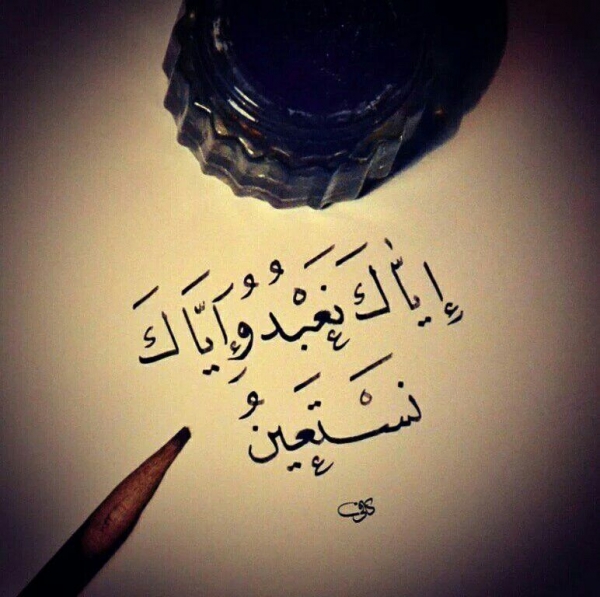Al Fatiha - Verse 5
Search more about verse :
Verse 5
Thee do we worship and Thee do we beseech for help
“al- Abd”(العَبد) means slave, a human being who is owned. In its abstract sense, it is applied to other intellectual beings also, as the words of Allah show:
There is no one in the heavens and the earth but will come to the Beneficent God as (“`abdan” عبْداَ = a slave) (19:93).
In modern usage, it is commonly translated as 'servant.' “al -'Ibadah “ (العِبادة = to serve, to worship, to obey) is derived from this word. Its inflexion and meaning changes according to the context. al-Jawhari has written in his dictionary, as-Şihah, that “the basis ofal-'ubūdiyyah (العبودية = bondage, servitude) is “al-khudu' (الخضوع) submission.”
But this explanation is not of the word; it only shows a concomitant quality of its meaning; because al-khudu` is used with the preposition ”li ” (لِـ), and al-`ibadah is used without any preposition.1
When a servant of Allah worships Him, he stands before the Lord as a slave stands before his master. That is why worship is diametrically opposed to arrogance and pride - but it is not so opposed to polytheism; after all, a slave may be jointly owned by two or more masters. Allah says:
Verily those who are arrogant to My worship shall soon enter Hell, disgraced (40:60).
. . and he should not join anyone in the worship of his Lord (18:110).
It should be noted here that polytheism - joining someone in the worship of Allah - is a possibility, and that is why it has been made subject of this prohibition; none forbids an impossible thing. But arrogance does not exist with worship, and that is why the expression, “arrogant to my worship”, has been used in the first verse.
Servitude is effective in those affairs which are owned or controlled by the master; and not in other matters related to the slave, like his being son of his father, or having a height of so many centimetres - there is no submission or servitude in such things. But the mastership of Allah is not limited; His mastership is not shared by anyone else, nor is the servitude of the creatures divided between Allah and someone else.
A master has only limited authority over his servants - he may employ them to perform certain duties, but he cannot kill them or punish them
unjustly. But Allah has total and all-encompassing authority over His servants; He does whatsoever He wills with them and about them. His ownership is unconditional and unlimited; and the servitude of His creatures is likewise unconditional and unlimited.
This “ownership” is true and exclusive on both sides: The Lord has the exclusive ownership, and the slave has the exclusive servitude. The construction of the sentence, “Thee do we worship”, points to this exclusiveness - the object, “Thee”, has been placed before the verb, and worship is mentioned without any condition.
It has been explained earlier that the owned thing exists and subsists because of, and with, its owner. In this sense, it should not divert an onlooker's attention from its owner. You look at a house belonging to Zayd; if you are looking at it merely as a house, you may possibly lose sight of Zayd; but if you look at it from the angle that it is a property of Zayd, you cannot wean your thoughts from him.
The only true attribute of the universe is that it is created and owned by Allah. Nothing in the creation can hide the divine presence, nor should looking at these things make one forgetful of Allah. He is ever present, as He has said:
Is it not sufficient as regards your Lord that he is a witness over all things? Now surely they are in doubt as to the meeting of their Lord; now surely He encompasses all things (41:53-54).
The true worship, therefore, is that in which the worshipped and the worshipper both are present. Allah should be worshipped as the One who is present before the worshipper - and that is why the third person of the preceding verses has been changed to the second person in this verse, “Thee do we worship”.
The worshipper should be present before his Lord, not only with his body but also with his soul; otherwise, the worship would be a body without soul, a form without life. Nor should he divide his attention between his Lord and someone (or something) else - neither openly, (as the idol worshippers do) - nor secretly (like the one whose mind is on something else while worshipping Allah, or the one who worships Allah because he wants to enter the Garden or to save himself from the hell).
All these diversions are various facets of polytheism, and Allah has forbidden it in His Book:
. . therefore, worship Allah, being sincere to Him in religion (39:2).
Now, surely, sincere religion is for Allah (alone), and (as for) those who take guardians besides Him, (saying): We do not worship them save that they may make us nearer to Allah, surely Allah will judge between them in that in which they differ (39:3).
Worship shall be a true worship when it is done with pure intention, and this purity has been named as the presence of the worshipper. This will happen only when the attention of the Worshipper is not fixed on anyone other than Allah (otherwise, it would be polytheism); and when his aim of worship is not any other hope or fear like that of the paradise or the hell (otherwise, the worship would not be purely for Allah).
Moreover, he should not be concerned with his own self, as it would tantamount to egotism and arrogance, completely opposite of submission and servitude. Probably the plural pronoun - “we” worship - points to this fact; it negates the individuality of the worshipper as he includes himself in a multitude of people; it removes egotism, creates humility, and effaces the tendency of self-importance.
The declaration of one's servitude with the words, “Thee do we worship”, is free from all defects, so far as its meaning and purity are concerned. Yet, as the servant describes the worship as his own act, it could create an impression that he thought to be independent in existence, power and will, while in fact he is only a slave and slave owns nothing.
The second sentence, “and Thee do we beseech for help”, removes this possible misunderstanding. It means: “We ascribe the worship to ourselves and make this claim only with Thy help; we are never independent of Thee.
In other words, the complete verse, “Thee do we worship and Thee do we beseech for help”, gives a single meaning, and that is “worship with purity of intention”. Probably, that is why both sentences have the same style; otherwise, it could be said, 'Thee do we worship; help us and guide us . .'The style has been changed in the next verse, “guide us . .” and its reason will be explained later.
The above-given explanation makes it clear why the pronouns in this verse have been changed from the third to the second person; why the restrictive device of putting the object (“Thee”) before the verb has been chosen; why the worship, in “do we worship”, is used without any condition; why worshipper includes others with him in this declaration of allegiance and worship; why the second sentence is needed after the first; and why both have the same construction and style.
The scholars have written other fine points about this verse; the reader is advised to refer to their books for this purpose; Allah is the creditor whose debt can never be repaid.
beseech |
ask (someone) urgently and fervently to do something; implore; entreat. |

